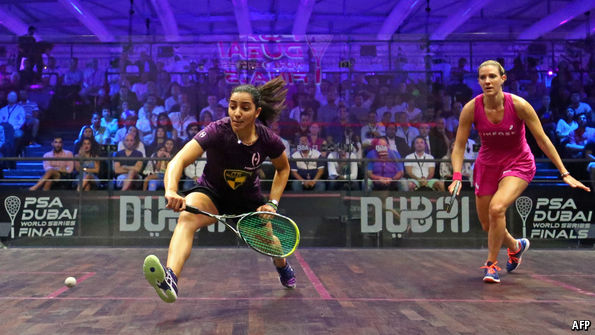Dead rubber – The Economist (blog)

TWENTY-EIGHT sports have been contested in the 2016 Olympic games in Rio. Yet though that number makes it impossible to keep track of all 306 events, it is still not enough to include all disciplines that would like to feature. Despite much vigorous campaigning by the World Squash Federation (WSF), a bid to add the game to the Rio schedule was rejected by the International Olympic Committee (IOC) in 2009. Last year, the WSF learned that the sport would be excluded from the 2020 Games, in Tokyo, too—even though climbing, surfing and skateboarding were admitted. It was the third consecutive time that squash’s bid to join the games had been turned down.
The WSF has made clear its desperation to join the Olympic programme. So have leading squash players: Nicol David, the eight-time women’s world champion, has repeatedly said that she would swap all her world titles for an Olympic gold medal. This only makes golf’s striking ambivalence about the merits of joining the games all the more infuriating. The IOC “should be held accountable for prioritising a second-rate golf contest over the many willing, enthusiastic athletes from a range of sports around the world,” James Willstrop, a former world number one, wrote recently.
By most of the criteria that the IOC uses to measure prospective sports, squash appears to have a strong case. It has a long history, dating back to the 1830s. The sport has genuine global appeal: last year 47 countries hosted tour events, featuring players from 74 nations. There are 1.6 million American players, and more than 20 million worldwide, according to US Squash. Logistically, squash would also be an easy fit for the games. The event that the WSF has proposed—singles tournaments for men and women, featuring 32 players apiece—could be run exclusively on two all-glass courts, either inside or outside. And squash has already shown its suitability in other multi-sport events: more than one million people watched the men’s singles final in the last Commonwealth Games. “We would bring something special to the Olympics,” says Andrew Shelley, the chief executive of the WSF.
Why, then, has squash repeatedly been rejected by the IOC? Perhaps the best explanation is bad timing. Until 2005, the WSF did not make a bid for Olympic inclusion, considering itself unready to do so. In 2016, golf and rugby (in the form of sevens) both rejoined the games after long absences; the sports are far more lucrative than squash, boosting the commercial value of the Olympics. Squash’s bid for 2020 was also damaged by the fact that the event is taking place in Japan. New rules allow the hosts to propose additional sports: the change allowed karate to join the programme for the first time. These bids have also been stymied by a belief that the sport was not television-friendly, that the ball was hard to see and the courts difficult to film. But the WSF has invested in “Squash TV”, which was launched three years ago: higher-quality cameras have improved ball visibility, as have better-lit courts.
The WSF believes that squash would enjoy significant benefits if it were added to the Olympics. Though the sport would not receive the same financial boost as rugby sevens—national Olympic federations have spent over $30 million in preparation for the games over the last four years, according to World Rugby, the sport’s governing body—Olympic inclusion would still produce something of a boon. It would entitle the sport to funding from the IOC; Mr Shelley says that even a few million dollars over a four-year cycle would make a “substantial difference” to the WSF’s development work. Yet the most significant benefits would not be financial, but in “visibility”, he says. Seeing the event in the games would help to grow squash’s fan base. And the prospect of winning an Olympic medal would also give young players another incentive to pursue a career in the sport.
The campaign to win inclusion for the 2024 games is already underway. Mr Shelley insists that the sport will grow regardless of whether or not it gains admission. But as countries continue to prioritise Olympic sports for funding, squash risks being left behind. “So long as it continues in its current position, the sport is at a significant strategic disadvantage and is losing market territory to rival sports,” says Simon Chadwick, a professor of sports enterprise at the University of Salford. The IOC’s decisions as to which events should feature in the games do not simply reflect the popularity of sports around the world. They also determine which ones are best-placed to grow.



